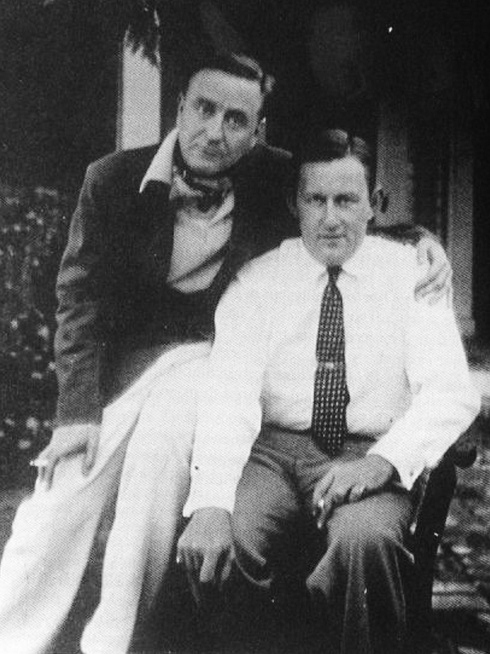
F. Scott Fitzgerald and John O'Hara, California, 1939.
photo ©Belle O'Hara, from Matthew J. Bruccoli, Some Sort of Epic Grandeur: The Life of F. Scott Fitzgerald (1981).
The Brooklyn Book Festival begins September 22, but in its pre-festival "Bookend" series today there's an evening on John O'Hara, who surely deserves an event. His short stories are gorgeous broken scenes of American life; his first novel, Appointment in Samarra (1934) still astonishes and amazes; and his style and themes -- a bridge, if you will, between F. Scott Fitzgerald and John Updike -- remain painfully and beautifully relevant today.
Penguin Classics, publisher of the gorgeous new 2013 edition of Appointment in Samarra with a snapping dust jacket by Neil Gower, advertised the "Bookend" event on Twitter with a quote from Fran Lebowitz, calling O'Hara "the real Scott Fitzgerald." John O'Hara would be the first to abjure this tag, though it would have flattered him immensely. He loved Fitzgerald's writing, and said so many times. In some of his earliest published stories, O'Hara made that clear with a mixture of parody and imitation.
O'Hara's admiration for Fitzgerald's first novel This Side of Paradise (1920), as a teenager, is well documented -- he fell in love with the book, that's how he put it. In a much-published letter to John Steinbeck, O'Hara called Fitzgerald a better writer "than all of us put together." It's not surprising to find Fitzgerald the author he had to copy, and try to surmount, when O'Hara began submitting stories to a new Manhattan magazine called The New Yorker as a 23-year-old in 1928.
One of O'Hara's early stories, "Most Likely to Succeed," is a fine example of what I mean. Published in the June 7, 1930 issue, it features a narrator who's almost exactly like Amory Blaine, Fitzgerald's sad young man whose story is This Side of Paradise. The plot is pure Fitzgerald too. In "Most Likely to Succeed," for example, the young man explains that "ever since Prep school I'd wanted to belong to Cottage" and that he got a bid there after styling himself "to be what I thought Cottage wanted." Amory, like Fitzgerald, was a member of Princeton's University Cottage Club. Fitzgerald loved his time at Cottage so much that he'd given the lines of its red-and-white Georgian Colonial revival style, and row of French windows, to Tom and Daisy Buchanan's mansion - and installed Cottage's replica of Oxford's Merton College library in Jay Gatsby's own house.
O'Hara began a correspondence with Fitzgerald in 1933, with a fan letter. They would exchange thoughts about writing and their common Irish-American ancestry, among other things. In the late 1930s, when Fitzgerald was struggling and O'Hara was succeeding as a writer in Hollywood, O'Hara provided one of the last remembrances about Fitzgerald -- and photographs taken of him. Sheilah Graham, Fitzgerald's partner at the time, remembered O'Hara negatively in general, and as always readily around for a highball; O'Hara, however, told of reading the draft of Fitzgerald's unfinished The Last Tycoon one afternoon in Encino. Fitzgerald swore him to secrecy about the book, then brought out the manuscript. "When I had read it," O'Hara recalled, "I said 'Scott, don't take any more movie jobs until you've finished this. You work so slowly and this is so good, you've got to finish it. It's real Fitzgerald.' Then, of course, he became blasphemous and wanted to fight."* Fitzgerald was ill and prematurely aged, as you can easily see from the photograph. It was one of the last times O'Hara would see him.
O'Hara would choose to spend the last decade and more of his life in Fitzgerald's beloved Princeton, where he died and is buried today. A Princeton student once asked O'Hara why he lived in Princeton, and why so many of his novels featured characters who had gone there. O'Hara responded testily, "Why not Princeton?" I'd say because of Fitzgerald, on both counts.
* Sheilah Graham wrote about O'Hara in Beloved Infidel (1959); the O'Hara quotation about The Last Tycoon is from Matthew J. Bruccoli, Some Sort of Epic Grandeur: The Life of F. Scott Fitzgerald (1981; 1991) 569.
